Posted August 19, 2017 by Nicky in Reviews / 0 Comments
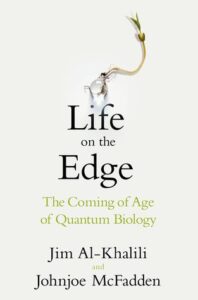 Life on the Edge: The Coming of Age of Quantum Biology, Jim Al-Khalili, Johnjoe McFadden
Life on the Edge: The Coming of Age of Quantum Biology, Jim Al-Khalili, Johnjoe McFadden
I’ve been meaning to read this for a while now, though also somewhat afraid of the idea — quantum biology?! Do y’all have to bring quantum (which I don’t understand) into biology (which I mostly do understand)? How rude! But this book is really clear about the concepts it describes, and there’s nothing too mind-boggling in it. Sometimes, in fact, the patience the authors had with explaining a concept I already understood was a little frustrating — but will open the book up to a bigger audience.
Do they have a point? Yes, I think so. I’m not sure it’s proven that quantum effects have a major impact on all the biological processes they discuss, but it seems pretty clear from the research they reference that quantum effects are there and might even solve some of the problems we still have in biology.
More research is needed, though — and this is one field you won’t find me trying to join, I think! It’s fascinating stuff, but I’m not a quantum fan.
Rating: 4/5
Tags: book reviews, books, non-fiction, science
Posted August 11, 2017 by Nicky in Reviews / 0 Comments
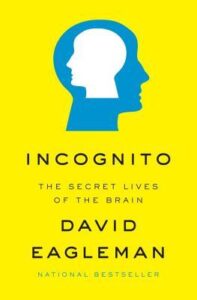 Incognito, David Eagleman
Incognito, David Eagleman
This book is mostly a very readable account of some of the standard weird things your brain does, but it does contain a very valuable discussion of a serious nature, too. David Eagleman shows through examples how often our behaviour is ruled by factors we don’t control — things in our brain that we may not even know about, but which nonetheless change us. And of course that poses a big question when it comes to criminal behaviour: can we be blamed for “choosing” to do something when we only “choose” to do so because we have a brain tumour?
He gives a decent amount of space to a discussion of how the criminal justice system should work given that we know this, and while other reviewers think that what he suggests impinges on civil liberties, I’m not so sure. By my reading, he’s suggested that people can either just sit in prison for as long as necessary, to remove them from society, or they can voluntarily choose to undergo therapies to help them change their behaviour. If that doesn’t work, then they may have to remain incarcerated because otherwise they would reoffend. As long as it is a choice, I don’t see why such an intervention would be inethical — at least no more inethical than letting someone rot in prison for the rest of their life. There are some people for whom that’d be worse than death, after all.
At any rate, this book might make you feel a little bit uncomfortable as regards how much free will you have and what your brain is doing behind your back. Still worth a read! I’d probably rate it higher if it had more info that’s new to me.
Rating: 3/5
Tags: book reviews, books, non-fiction, science
Posted August 9, 2017 by Nicky in Reviews / 0 Comments
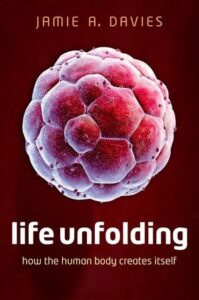 Life Unfolding, Jamie T. Davies
Life Unfolding, Jamie T. Davies
Well, now I feel silly that I didn’t read this before my human biology exam! It describes, in very careful detail, how the human body builds itself, beginning at the point an egg is fertilised. It explains processes like cell division and gastrulation, and generally manages to make the whole complex process comprehensible. Davies doesn’t get hung up on quantum biology or how consciousness is generated, but instead focuses on the physical processes by which the human body grows.
You may not find this entirely satisfying, because Davies very much relies on the fact that small events — a chemical gradient, a lack of symmetry in a cell — seem to prompt massive changes. If you feel (like this reviewer) that it’s quite impossible for all this to happen just by a number of useful proteins happening to bump into each other in a sea of proteins which won’t interact at all, you’ll find this unsatisfying. There seems to be no room for a guiding ghost in the machine. But that is the best understanding we have, I’m afraid — and as a biologist, it makes sense to me. Which is not to say that it’s all perfectly understood: it isn’t. Sometimes, we can’t do the experiments in a human context for ethical reasons. Sometimes, the data is just too difficult to obtain. But the fact remains that we do have a reasonable understanding of embryology, and that is described in this book.
I found it an easy and fascinating read, and would definitely recommend it if you have an interest. It doesn’t get too technical as far as I’m concerned (but take that with a pinch of salt, since I have admittedly studied human biology). At a couple of points I found it useful to look up relevant Khan Academy videos to get a differently-worded explanation of the same events, taken step by step, but that’s as much down to individual learning and teaching styles as anything.
Rating: 4/5
Tags: book reviews, books, non-fiction, science
Posted August 4, 2017 by Nicky in Reviews / 0 Comments
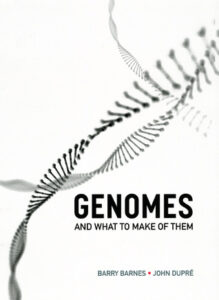 Genomes and What To Make of Them, Barry Barnes, John Dupré
Genomes and What To Make of Them, Barry Barnes, John Dupré
This book is from 2008, so in terms of the science and its impact on the world, it’s a bit behind the times. It’s still a good primer on how the world was changing from a fairly monolithic view on genes to an understanding of the whole genome, “junk” DNA included, and it covers some worthwhile discussions. I found it a bit dry and pedantic at times, though it doesn’t help that the science was well below the level I understand now.
It’s most worth it when it focuses on the implications of the new genomics and the technologies involved. But I might be inclined to say skip it and look for something more modern if you’re not super interested.
Rating: 2/5
Tags: book reviews, books, non-fiction, science
Posted August 1, 2017 by Nicky in Reviews / 0 Comments
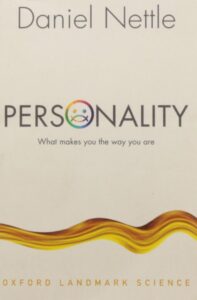 Personality, Daniel Nettle
Personality, Daniel Nettle
I don’t quite see why this is part of the Oxford Landmark Science range. To me, it’s a relatively low level analysis of the factors that go into personality, much of which I’ve read elsewhere in other popular science books which aren’t so tightly focused. It’s not that it’s a bad book, or uninteresting; there are some things I didn’t know, and it’s interesting to see how Nettle explores the two sides to each of the main personality factors identified — the downside to being extroverted, for example, and the downside to ‘openness to experience’.
Still, none of it is revelatory, and he doesn’t spare much time for the criticisms of the whole idea of studying people’s personalities as if they’re a real thing you can test and measure. His conclusion is basically that of course you can, because you can obtain consistent data that falls into particular trends. I don’t think I disagree, but I’m sure there are more criticisms.
It’s an easy enough read, surprisingly light even for pop-sci.
Rating: 3/5
Tags: book reviews, books, non-fiction, science
Posted July 30, 2017 by Nicky in Reviews / 0 Comments
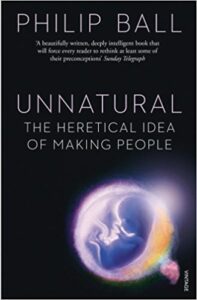 Unnatural: The Heretical Idea of Making People, Philip Ball
Unnatural: The Heretical Idea of Making People, Philip Ball
Although this is classed as ‘popular science’, more than half of it is essentially literary criticism. It’s all relevant to the kinds of anxieties humans have about artificial people, but if you’re here for cloning, IVF, gene editing, etc, then it’s pretty thin on that. I hadn’t thought about a lot of stuff in the way this book opens it up, but there was far too much waffling before it got to the actual science bit — I’d have enjoyed it more if it’d been marketed as literary criticism/history, or if there’d been more of the science stuff.
At the very least, Philip Ball writes clearly, and it’s not a chore to read except in that it wasn’t what I was hoping for. If you’re looking for something that’s a bit more holistic about the modern science around ‘making people’, including the myths and literature that inform and reveal our anxieties about it, then you’ll probably enjoy it.
Rating: 3/5
Tags: book reviews, books, history, non-fiction, science
Posted July 28, 2017 by Nicky in Reviews / 0 Comments
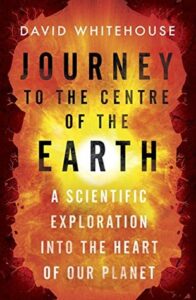 Journey to the Centre of the Earth, David Whitehouse
Journey to the Centre of the Earth, David Whitehouse
This book uses all kinds of insights from mineralogy and seismology to put together a picture of what the Earth’s composed of, layer by layer. Despite the author’s obvious enthusiasm, this isn’t one of my primary interests, and I did find my interest flagging at times — it seemed like some chapters were just unnecessarily dragged out and like he got off the point some of the time. Nonetheless, if this is the kind of science that enthuses you, it’s worth reading — it deals with the history of the study of our Earth as well as the straightforward facts about the composition of each layer.
The more I learn about all kinds of science, including Earth science, the happier I am. Even if it’s not my field, I’m glad I read this.
Rating: 3/5
Tags: book reviews, books, non-fiction, science
Posted July 20, 2017 by Nicky in Reviews / 0 Comments
 A Rough Ride to the Future, James Lovelock
A Rough Ride to the Future, James Lovelock
I found Gaia interesting, and if not entirely in line with what I believe, still plausible; it’s obvious that the Earth’s ecosystems are governed by systems of feedback, and that sometimes that has had a stabilising effect — and that life continues to find a way to survive. From this book, it seems like Lovelock believes the ‘rough ride’ is mostly for humanity, ignoring the fact that we’ve severely thrown off natural systems, and that we’re not innocent in this. We’ve known we’re doing it for quite some time, and yet he sort of shrugs it off and says there’s no use feeling guilty. Well, guilt won’t fix the climate, but a sense of responsibility might help.
He’s right that humans have to change and adapt to the changing climate, but I’m not so sanguine that’s going to be enough for life to go on. I’m pretty sure bacteria and archaea will get along fine, but we’re decimating the ranks of amphibians, big mammals, sea creatures, etc. And he’s not always up on modern science: he still seems to believe, here, that the atmosphere can’t be more than about 25% oxygen without causing regular devastating fires. He’s wrong: we know the oxygen saturation has been much higher, and life went on — that’s why there were gigantic dragonflies; they couldn’t have survived in a lower-oxygen atmosphere.
While the Gaia theory has been influential, I think perhaps Lovelock should sit down and stop profiting by it. This book is rather rambling, at times even confused.
Rating: 2/5
Tags: book reviews, books, non-fiction, science
Posted July 6, 2017 by Nicky in Reviews / 0 Comments



Nature’s Patterns: A Tapestry in Three Parts — Shapes, Flow, Branches, Philip Ball
There’s a lot of info in these three books about patterns formed both by life and by other, non-living natural processes. Sometimes it got a little too much for me to process and I started glazing over — mostly when math came into it. EVen given that, it’s still a fascinating look about how patterns form, and a good note of caution to sound about genetic determinism. Just as the colours of a calico cat aren’t determined genetically — so a clone of one calico cat would not have the same patterns as the first — neither are many other patterns in nature, whether in pelt colour and pattern or the building of nests. Instead, there seem to be sets of rules built in: processes that will occur in all genetically normal members of a species, but which won’t produce the same pattern time and again.
It’s also a good reminder that even with Batesian mimicry, there’s no intent behind it. The genetic code just happens to code for proteins which work in a particular way, ultimately producing a particular pattern. That’s obvious when we see the way other natural systems create the same patterns — rivers, sand dunes, chemical reactions.
Worth reading, definitely. And personally, I was really intrigued to learn that it was Alan Turing who actually proposed some theories of how animals get their patterned fur. Not just a code-breaking genius, clearly. Individually, I might rate each of these three books a ‘3’, but together… a 4, I think.
Rating: 4/5
Tags: book reviews, books, non-fictions, science
Posted June 25, 2017 by Nicky in Reviews / 0 Comments
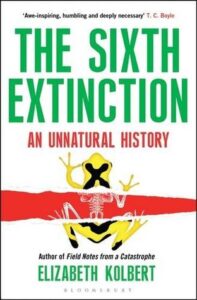 The Sixth Extinction, Elizabeth Kolbert
The Sixth Extinction, Elizabeth Kolbert
Considering the subject matter — the extinction or likely extinction of much of Earth’s biodiversity — Kolbert manages to write an absorbing narrative which wasn’t just depressing, though it sometimes was that, but also fascinating. She covers various creatures that we may have seen the last of, or may soon see the last of; creatures which only survive in captivity, and creatures which we didn’t even think to protect.
The fact is, humans are doing a lot of damage to our own ecosystems. Kolbert documents that and shows where it’s going, or at least, where it’s likely to go. What happens in the end is still, maybe, there for us to change. Maybe. It’s too late for a lot of species — perhaps most amphibians, for example — but we might still be able to stop this. The Sixth Extinction goes into some of the delights biodiversity has to offer, perhaps in hopes of inspiring some people to step up.
None of it came as a surprise to me, but I found the book interesting and entertaining all the same, if not exactly uplifting.
Rating: 4/5
Tags: book reviews, books, non-fiction, science
 Life on the Edge: The Coming of Age of Quantum Biology, Jim Al-Khalili, Johnjoe McFadden
Life on the Edge: The Coming of Age of Quantum Biology, Jim Al-Khalili, Johnjoe McFadden










